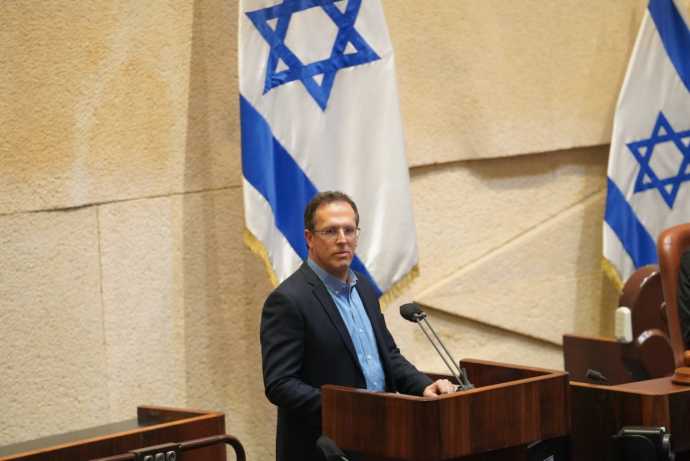Yesh Atid is the party that best exemplifies values that are important to liberal religious Zionists, Intelligence Minister Elazar Stern and MK Moshe Turpaz said in an interview with The Jerusalem Post this week.
With the November 1 election approaching, three parties are promoting themselves as the ideal parties for liberal religious Zionists: Interior Minister Ayelet Shaked’s Habayit Hayehudi, Defense Minister Benny Gantz’s National Unity and Prime Minister Yair Lapid’s Yesh Atid.
Nearly all of the relevant campaigns arrived at an early conclusion that this electorate would decide the election, as it is the only one wavering between the two blocs.
Shaked for this reason joined with two representatives of the liberal religious-Zionist camp, Givat Shmuel Mayor Yossy Brodny and former Hakibbutz Hadati general secretary Amitai Porat.
National Unity has Sports and Culture Minister Chili Tropper, whose op-ed is in today’s Post, and brought aboard Matan Kahana, who until recently was the religious affairs minister.

Yesh Atid’s representatives include Stern, a Knesset veteran, and Turpaz, who became an MK thanks to the Norwegian Law in 2020.
Kahana has a number of accomplishments to his name. He pushed through kashrut reform, leading to more competition and a broader spectrum of kashrut options to choose from. He also appointed women to serve on regional religious councils and more.
Yesh Atid founded squarely on liberal roots
Nonetheless, Yesh Atid is founded squarely on liberal roots and has acted most on behalf of more liberal religious-Zionist values, Stern and Turpaz argued.
“There is no doubt that Kinley [Turpaz’s nickname] and I fought for these things much more than Blue and White,” Stern said.
“We put it at the heart of our agenda,” he said. “We are a party that is liberal, not religious, but [a party where] the topics of liberalism and religious Zionism come together in their feeling of responsibility for the [state’s] Jewish character.”
“We are a party that is not religious but liberal, but [a party where] the topics of liberalism and religious Zionism come together in their feeling of responsibility for the [state’s] Jewish character.”
Intelligence Minister Elazar Stern
Stern founded the IDF’s Netiv program for conversion while serving as head of the Manpower Directorate. As an MK since 2013, he also operated on a number of fronts to bring a more inclusive Judaism into the public sphere, which on religious matters is currently dominated by the haredi (ultra-Orthodox) rabbinate. These included the Kotel Compromise, conversion reform and more.
But for Stern and Turpaz, liberal religious Zionism is not just about religious services. It also is about inclusiveness in general, as well as caring for the weak and needy.
“I think that religious Zionism also has responsibility over the country’s welfare, and it is not by chance that former [religious-Zionist] MK Avraham Burg served as welfare minister,” Stern said.
“There are children with special needs not only in the religious-Zionist community, but in all other communities as well, and we are doing more on this than anyone else,” he said. “This is true, too, for caring for Holocaust survivors, old-age stipends and more.”
Inclusive religious Zionism
Inclusive religious Zionism also means supporting LGBT rights, Turpaz said. The alternative is the party that calls itself the “Religious Zionist Party” but, in fact, fights inclusiveness, he said.
“We are an explicit alternative for [Religious Zionism Party leader Bezalel] Smotrich and [Otzma Yehudit faction leader Itamar] Ben-Gvir and shine a light on the dark corners of their activity,” he added.
One of these issues is LGBT equality, Turpaz said.
“[Smotrich and Ben-Gvir] strode in the [anti-LGBT] Beast Parade, while I walked with the father of Shira Banki [who was murdered in an attack on a Gay Pride Parade in Jerusalem in 2015] and with my students [from religious high schools],” he said. “In this regard, Stern and I say that our readiness to fight for liberal religious values was proven not just in the Knesset but also in the real world.”
Another issue that divides the Religious Zionism Party and the other parties in opposition leader Benjamin Netanyahu’s bloc is women’s rights, Turpaz said.
“Let us remember that Stern was the one to enable women to become combat fighters in the IDF as head of the Manpower Directorate,” he said. “Let us remember that in the top five of Yesh Atid, there are three women, but Bibi [Netanyahu] has zero women, and Smotrich and Ben-Gvir have zero women.
”The Religious Zionist Party does in fact have a woman at No. 4, MK Orit Struk, and one other woman in the top 10. The Likud has one woman in its top 10.
“Yesh Atid is an example of a place where women take on leadership roles, while in Netanyahu’s nightmarish coalition there will only be six or seven women and maybe one or two women ministers around the cabinet’s table,” Turpaz said.
“I think that ultimately, the religious-Zionist woman wants women to be around the decision-makers table when deciding about her body, about her IDF service and about her education,” Turpaz said. “On our side, there are 40% women, and on the other side, there are 10% women. That is a fundamental difference between whether Lapid forms the coalition or, God forbid, Netanyahu does.”
With rumors that Shaked was considering dropping out of the race, Lapid tried to endear himself to liberal religious voters on Tuesday in an effort to pick up some of her voters.
In a video, he spoke about the “founding values” of religious Zionism, including serving as a bridge between the “religious and secular, the Jewish and the Israeli, social solidarity and love of the land.”
“But suddenly there is no bridge,” Lapid said. “Religious Zionists became the name of an extreme [party that is driving apart the people of Israel. We in Yesh Atid want to rebuild the bridge.”
But with Shaked announcing late Tuesday that she was continuing until the end, the race for the liberal religious-Zionist vote remained three-legged.
